- Home
- Elif Shafak
The Architect's Apprentice Page 11
The Architect's Apprentice Read online
Page 11
Taking a blade out of his sash, Sinan chipped a chunk from a log nearby. As he carved, he began talking about Ağırnas, the village where he had been born – the hedged crop fields, the Greek and Armenian churches with no bells, and the icy winds that hummed like sad songs; the yoghurt soup his mother made and served cold in the summer, hot in the winter; the carpentry his father had taught him, where even the tiniest piece of wood was breathing and alive. Becoming a Janissary and converting to Islam when he was twenty-one, he had joined the Hearth of Haci Bektash, named for the dervish patron of the Janissary corps, and taken part in war after war: Rhodes, Belgrade, Iran, Corfu, Baghdad and, the bloodiest of them all, Mohacs. He had seen the bravest turn tail, the timid bloom into lionhearts.
‘My elephant …’ said Jahan when he could find his voice. ‘Olev and I taught him how to kill. Now he has killed. Many.’
Sinan stopped carving. ‘Don’t be upset at the animal. Don’t blame yourself.’
The boy shivered, suddenly cold. ‘When we made that bridge, I felt useful, effendi … I wish we had stayed there.’
‘When you do things from your soul, you feel a river moving in you, a joy.’
‘Who said this?’
‘A poet, a wise man.’ Sinan placed his hand on the boy’s forehead. It was hot. ‘Tell me, would you like to build more?’
‘Yes, I’d like that very much,’ Jahan replied.
When darkness descended, they headed back to the camp. Halfway there they came across a saddled horse trotting around on its own, its rider gone. Sinan made Jahan sit on the horse, and led it by the reins back to camp. He took Jahan to his tent and told the grooms to take care of the elephant while the boy got some rest.
Burning with fever, Jahan fell into a painful slumber as soon as he lay down. Sinan stayed beside him, putting vinegar-soaked cloths on his face and arms, and continuing with his carving. At dawn, when Jahan’s temperature dropped, Sinan opened the boy’s clenched fist, placed a gift upon his palm and left. The next morning, when the boy woke up, drenched in sweat but otherwise fine, he found himself holding a wooden elephant. On its face, instead of sharp, lethal tusks, it had two flowers.
The city was awaiting its army. Since sunrise people had been pouring out, filling the streets and squares like thick, gooey shurub.* Climbing up on trees, perching on roofs, squeezing into every smidgen of space alongside the road from Adrianople Gate to the palace, thousands were eager to welcome the victors. Istanbul, with its serpentine alleys, underground passages and closed bazaars, had donned her best gown and was, for once, all smiles.
‘The soldiers’re comin’!’ exclaimed an urchin who had planted himself above a fountain. His words, ripples on the surface of a pond, spread out, reaching the shores of the crowd and from there pushing back towards the centre – altered along the way. By the time the same child heard the echo of his exclamation, it sounded rather different: ‘The Sultan’s givin’ out coins!’
Townsmen with joy and pride in their hearts, merchants with pouches sewn into their hems, liver vendors with strips of meat hanging from poles and stray cats on their heels, Sufis with the ninety-nine names of God on their tongues, scribes with ink stains on their fingers, beggars with bowls dangling from their necks, pickpockets with hands as nimble as squirrels, travellers from Frangistan with a startled look and Venetian spies with honeyed words and astute smiles – everyone inched closer, keen to see.
In a little while, the Sultan’s elite guards passed under an arched gateway in full regalia, leading the cavalcade down the acacia-lined thoroughfare, their horses at a ceremonial trot. Following them, mounted on a purebred Arabian stallion, clad in an azure kaftan and a turban so high as to confuse a passing stork on the lookout for a nest, was Suleiman the Magnificent. A collective gasp rose from the audience and mingled with prayers and adulations. Rose petals danced in the air, sprinkled from a hundred windows and balconies.
Behind rows and rows of armour-clad soldiers, some marching, some riding, some pulling their horses by the reins, came the elephant and the mahout. Initially Jahan had been ordered to sit on the animal’s neck and leave the howdah to the Janissary agha. After a few steps in this way, however, the man had asked to be brought down, his face ashen. Accustomed as he was to tempestuousness of all kinds, the elephant’s sway proved too much for the Ottoman nobleman. Hence Jahan ensconced himself inside the howdah in the manner of an exiled prince returning home after years abroad. The feeling was strangely sweet. For the first time in days he forgot about the battleground and the stench of death that still wafted from his skin.
Soon it became apparent that the white elephant would be the centre of attention. No one, other than the Sultan, received so much applause and admiration. People everywhere were pointing at Chota, waving, laughing, clapping. A clothier flung strings of ribbons; a Gypsy lass sent a kiss, giggling; a guttersnipe fell down from the branch on which he had climbed, trying to touch the beast’s tusks. As Chota sped along, swinging his tail left and right, buoyed by the warm reception, Jahan glided on in a daze of his own. Never had he felt so important, wrapped in the delicious fancy that his presence in this city, if not in this world, filled a unique void. With his cheeks flushed in gratification, he waved back at the spectators.
In the menagerie, Chota was greeted like a hero. It was decided that he would not be sent to the other menageries in the city. He would stay here in the seraglio. His daily ration was doubled and he was allowed to take a bath, every week, in the lily-covered pond at the far end of the courtyard – a privilege that no other wild animal was given. None of the others were permitted to leave the menagerie.
Gradually Jahan forgave the elephant for the way he had behaved on the battleground. He covered his knife-like tusks with two silken balls, and made a new mantle for him with his own hands. He garnished the trims with silver bells and sewed on blue beads against the evil eye. Languid and placid sunsets slipped by. Blissful days these were – though, as too often happens with blissful days, they would be appreciated only when they were no more.
Several days later, while Jahan was cleaning out the barn, Olev the lion-tamer appeared by his side. He said, ‘Someone sent you a message.’
‘Who?’ Jahan asked, a crack in his voice.
‘Haven’t seen the chap myself. He gave it to a guard so that he’d pass it to you, so I am told.’
Thus saying Olev produced a folded piece of vellum.
‘I am illiterate,’ said Jahan quickly, as if hoping this would shield him from the contents of the letter. Nor was it exactly true. With the help of Taras the Siberian he had been studying the alphabet. Having discovered the key to the mystery of letters, he had started to wade through books, though handwriting he still found difficult.
‘There’s nothing to read. I’ve checked it,’ said Olev.
Jahan took the vellum and opened it. There on the smooth surface of the skin was a picture. An elephant, quite badly drawn, but an elephant nonetheless, and on his back a boy with large ears. The animal carried a smile on its shapeless face and looked happy, while the boy had a spear through his heart. Three drops trickled from the end of the spear. Only these had a colour, a deep dark red, for they were made with blood.
‘I don’t know what this means,’ said Jahan, his jaw set tightly, and pushed the letter away.
‘Fine,’ said Olev after a brief lull. ‘In that case we shall destroy it and not mention it to anyone. But whoever this person is, you better start thinking about what you’re going to do if he shows up. The walls of the palace are high but not high enough to protect you from evil.’
The second time the Sultana visited the menagerie there was something in her attitude towards the elephant that hadn’t been there before: a speck of approval, nigh on appreciation. Again her skirts swished by; again Jahan threw himself on the ground; again her entourage waited to one side, so silent they might have ceased to exist. And once again Mihrimah watched it all with a suppressed smile.
‘They say your
elephant was brave,’ Hurrem remarked without so much as glancing in the mahout’s direction.
‘Yes, your Highness. Chota fought well,’ said Jahan. He did not tell her how the animal had gored soldiers, and how he still felt guilty about having taught him to do so.
‘Hmm, but not you, I heard. Is it true you were scared and ran away and came back shivering with fear?’
Jahan’s face turned ashen. Who could have whispered such things behind his back? Reading his mind in one swift glance, Hurrem said, ‘Birds … Pigeons bring me news from everywhere.’
Try as he might to remain indifferent, Jahan believed what she said. In his mind’s eye he saw the birds of the aviary flying far and high, carrying in their beaks tidbits of gossip for the Sultana.
‘I also heard that your elephant was the people’s darling. Everybody loved it. They applauded the white beast more than they applauded the Janissary agha.’ Hurrem paused, waiting for her words to sink in.
Jahan knew this was true. Even the commanders in the army had not been showered with as much love as Chota had.
Meanwhile, Hurrem went on. ‘I have been thinking … Our sons, the two princes, shall be circumcised. There’ll be a parade. A big one.’
Uneasiness came over Jahan as he wondered where this was going.
‘Your Eminent Sultan and I would like to see the elephant perform.’
‘But –’
Already she had turned on her heels. ‘But what, Indian?’
Instead of syllables Jahan produced beads of sweat.
‘Beware, there’re some people who’re not taken with you. They think there is something untrustworthy about you. They say you and the beast should be sent to that ruined church to stay with the other big animals. They are right. But I have faith in you, young man. Don’t betray my trust.’
Jahan swallowed. ‘I won’t, your Highness.’
It was a habit of Hurrem’s to threaten and sweet-talk interchangeably, breathing down people’s necks to make it clear she could crush them should she have the desire to do so, then tossing a flattering remark or two, leaving them confused, beholden. Jahan, however, had no way of knowing this and would learn of it only in time. She strutted away, her chambermaids scurrying to keep up with her. Once again, two figures stayed behind. Princess Mihrimah and Hesna Khatun.
‘My Lady Mother seems to be fond of the white elephant,’ Mihrimah said witheringly, like a girl imitating her parent’s tone. ‘If you entertain the crowd well, Mother will dote on you. If Mother dotes on you, you and your beast will be happy.’
‘Chota doesn’t know any tricks,’ Jahan said in a voice so low he wasn’t sure if he actually said it.
‘I remember you saying that.’ Mihrimah gestured to her nursemaid, who produced a dozen circlets from the inside of her long, loose jacket. ‘Here, start with these. Dada and I will come and check how you are getting along.’
That week Jahan spent every afternoon tossing circlets to Chota, all of which the elephant ignored. Circlets would be replaced by hoops, hoops by balls, and, eventually, balls by apples. Only the latter worked: Chota cared to catch apples so that he could send them to his stomach.
Even so, Mihrimah and her nursemaid came every day. When Chota learned a new trick, the Princess commended him and rewarded him with sweet treats. When the beast failed, she encouraged him with even sweeter words. Once again, the white elephant had brought the Princess and the mahout together. Yet they were not children any longer. Both had grown fast. And, although they tried not to glance at each other in that way, they could not help but notice the changes in each other’s bodies. Meanwhile, Hesna Khatun was the sullen, silent witness of all.
Jahan taught the Princess the things he had learned since he had arrived at the menagerie. He showed her how to tell an oak tree’s age by counting the rings inside its trunk, how to preserve a butterfly, how resin turned into dazzling amber. He told her how ostriches could run faster than horses or how the stripes on every tiger were unique in the way the fingerprints of humans were. She, too, began to confide in him. Little by little, she told him about her childhood, her brothers and her mother. Being the only daughter amid boys, one of whom was destined for the throne, she had felt lonely, she said. ‘They loved me but they never paid enough attention to me. I was different. Because I was different, I was lonely. Can you understand that, Jahan?’
Jahan nodded. That was the one thing he understood well – the loneliness that came with being different.
The one person Mihrimah would never talk about was her father. Both the mahout and the Princess were behaving as though the Sultan wasn’t there, in the midst of their lives. Yet, deep inside, they both knew that if he were ever to hear of these garden escapades, all hell would break loose and Jahan would not only lose his job but in all likelihood be sent to a dungeon, where he might be forgotten till the end of time.
Before the circumcision celebrations, the plague arrived. First appearing on the outskirts of the city, in the hovels by the port of Scutari, it spread faster than wildfire, jumping from one house to the next, the curse scattered in the wind. Death settled over Istanbul like a fog that wouldn’t lift, seeping through every hole and crack. It fluttered about in the sea breeze, frothed in the yeast of bread, brewed in the thick, bitter coffee. Little by little people stopped going about; shrinking from gatherings, they sank into solitude. The splash of oars and the murmurs of oarsmen could not be heard even on the quietest evenings. No one wished to journey from one shore to the other if they didn’t have to. Never had Istanbulites been so afraid of standing out in the crowd. Never had they been so afraid of offending God.
For He had a peevish disposition, the God of the early days of the plague. People were forever worried about the wrong word escaping from their lips, the wrong hand touching their skin, the wrong smell filling their nostrils. They bolted their doors and darkened their windows to avoid the sunrays that spread the disease. Each quarter became hedged in, each street a citadel no one ventured beyond. They spoke in hushed tones, hunched their shoulders and dressed down, wrapped up in modesty. Coarse fabric was substituted for fine linen cloth; elaborate headdresses were abandoned. Golden coins – thrust into jugs, locked into chests – were buried deep. The wives of the wealthy hid their jewellery and slipped into the garments of their handmaids in the hopes of gaining God’s favour. Promises were made to go on pilgrimage to Mecca this year and to feed the poor in Arabia. Istanbul was bartering with God – offering habits, offering sacrificial lambs, offering prayers, losing, losing.
Yumrucuk they were called – too pretty a name for the swellings that appeared on the armpits, thighs and necks of the victims. Upon closer inspection, some saw the unmistakable face of Azrael. A sneeze was an ominous sign – people flinched when they heard one. That is how it began. The body broke into boils that swiftly grew bigger, darker. Then came the fever, the vomiting.
It was in the wind, they said; the night air, soiled like grime, was infested with miasma. The rooms in which the victims met their end were scrubbed with vinegar, whitewashed with lime, sprinkled with holy water from Mecca, then abandoned. Nobody wanted to linger in a place with a resentful ghost.
That the rich and mighty were also dying was consolation for some; a sign of hopelessness for others. When a man fell sick, his wives would start quarrelling about who would attend him. Ordinarily, the eldest – or the barren, if there was one – wife would take over. At times a concubine would be sent for. There were men who had four wives and a dozen concubines but still breathed their last alone.
The corpses were carried on carts pulled by oxen, the screech of wheels pulsating on the cobblestones and a sharp tang following along. The cemeteries on the slopes of hills grew over-full, bloated like the sheep slaughtered, skinned and hung from trees on Eid. The gravediggers made each new pit deeper and wider than the previous one, at times burying bodies by the dozen. They kept it to themselves that most of the dead had been neither washed nor shrouded. Some were laid to rest wit
hout so much as a gravestone. Grief was an indulgence only a few could afford. Death had to stop harassing the living for the dead to be properly mourned. When the plague had gone, only then would kin and kith beat their breasts and shed their tears to their heart’s content. For now, grief was pickled and preserved, kept next to the salted meat and dried peppers in the cellars, to be partaken of in better times.
Ships were sent back without having offloaded their merchandise; caravans were ordered to change their routes. The malady had sprung from the West, like all evils. Travellers, wherever they might be coming from, were met with suspicion. Runaways, itinerant dervishes, nomads, vagabonds, Gypsies – anyone without roots was unwelcome.
Midsummer, the disease seized the Grand Vizier Ayas Pasha – a man believed to be all-powerful. His death unsettled the seraglio. Suddenly, even the walls of the palace were not strong enough to keep the contagion at bay. That same week four concubines got infected, fear darker than kohl swirling in the corridors of the harem. They said Hurrem shut herself in a chamber with her children and refused to see anyone other than the Sultan. She cooked her own food, boiled her own water, even washed her own garments, distrusting the servants.
In the menagerie three trainers died, each in the springtime of life. And Taras the Siberian hid in his shed for days, for everyone hated him, still alive, old and frail as he was. Gone were the days when people didn’t want to be seen on the streets. They hurried to mosques, synagogues and churches to pray and repent, repent and pray. Their sins had brought the calamity, the ones they had committed and were sure to commit. It was God’s wrath. The flesh was weak. No wonder black roses bloomed on their bodies. Jahan listened to these words, his heart pulsing in the hollow of his throat, believing and disbelieving. Had God created humans, with their foibles, just so as to be able to punish them afterwards?

 Black Milk: On Writing, Motherhood, and the Harem Within
Black Milk: On Writing, Motherhood, and the Harem Within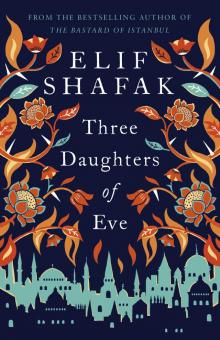 Three Daughters of Eve
Three Daughters of Eve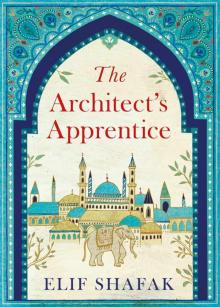 The Architect's Apprentice
The Architect's Apprentice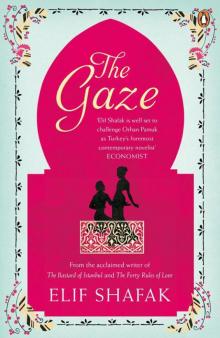 The Gaze
The Gaze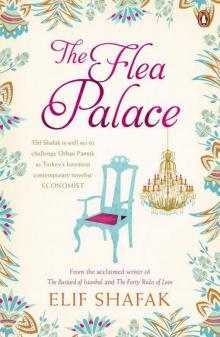 The Flea Palace
The Flea Palace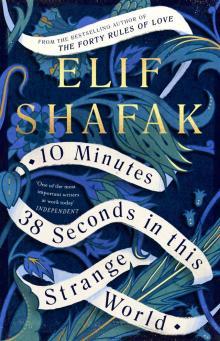 10 Minutes 38 Seconds in this Strange World
10 Minutes 38 Seconds in this Strange World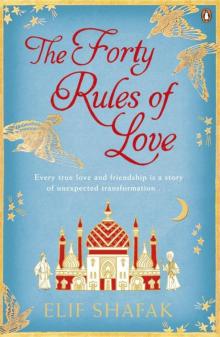 The Forty Rules of Love
The Forty Rules of Love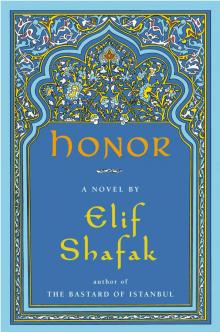 Honor
Honor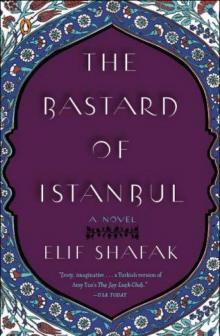 The Bastard of Istanbul
The Bastard of Istanbul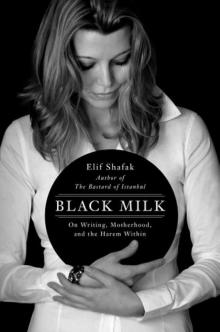 Black Milk
Black Milk The Happiness of Blond People (Penguin Specials)
The Happiness of Blond People (Penguin Specials)